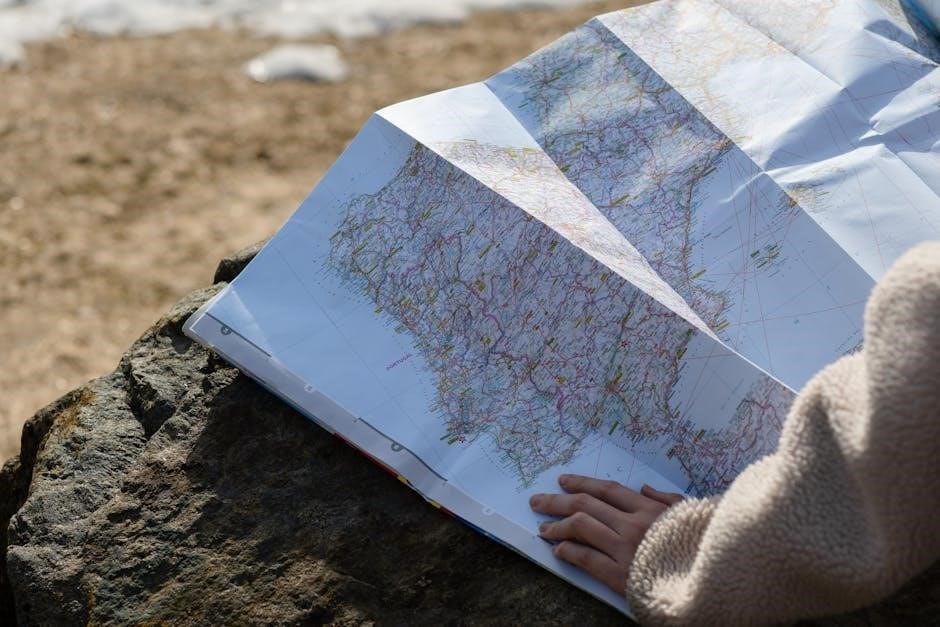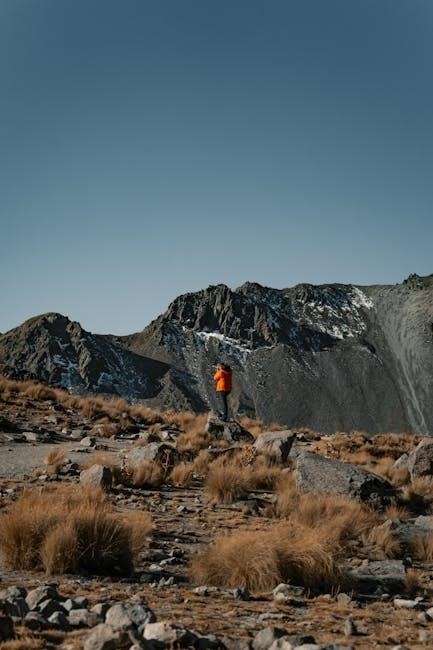The AMGA Rock Guide Course offers comprehensive training for aspiring guides, focusing on advanced climbing techniques, safety protocols, and leadership skills to ensure professional development and public safety.
Overview of the AMGA Rock Guide Course
The AMGA Rock Guide Course is a comprehensive program designed to train aspiring rock guides in advanced climbing techniques, safety protocols, and leadership skills. It emphasizes protecting the public interest in mountain travel, focusing on risk management and client care. The course structure includes a 10-day Rock Guide Course (RGC), followed by an Advanced Rock Guide Course (ARGC) and an Aspirant Exam. Participants must demonstrate proficiency in trad climbing, route finding, and navigation. The program is not solely about climbing ability but also about developing the skills to safely guide others. It is a critical step toward becoming a certified professional guide, requiring dedication and a strong technical background.
Importance of the AMGA Certification
The AMGA certification is a prestigious credential that validates a guide’s expertise, ensuring they meet rigorous industry standards. It signifies a deep understanding of technical skills, risk management, and client care. The certification is recognized nationally and internationally, enhancing professional opportunities in guiding. AMGA-certified guides are trusted for their ability to lead safely and effectively, which builds client confidence. The certification process also fosters a community of professionals committed to continuous improvement and ethical practices. It is a hallmark of professionalism, demonstrating a guide’s dedication to upholding the highest standards in mountain guiding. This certification is essential for those seeking a career in guiding, as it distinguishes qualified professionals in the field.
Who Should Consider the AMGA Rock Guide Course?
The AMGA Rock Guide Course is ideal for experienced climbers seeking to transition into professional guiding or enhance their leadership skills. It is tailored for those with a strong technical climbing background, particularly in trad and multi-pitch environments. Aspiring guides, outdoor educators, and serious climbers looking to refine their skills and safety protocols will benefit. The course is also suitable for outdoor professionals aiming to expand their career opportunities in guiding. Participants should have a solid foundation in climbing techniques, risk management, and client care. It is a valuable step for anyone committed to achieving a high level of competency in rock guiding and advancing their professional or personal climbing goals.

Prerequisites for the AMGA Rock Guide Course
The course requires a strong technical rock climbing background, demonstrated competence in multi-pitch terrain, and a commitment to safety and leadership development.
Climbing Experience Requirements
Prospective candidates for the AMGA Rock Guide Course must demonstrate a strong technical rock climbing background. Proficiency in traditional (trad) climbing is essential, as candidates are expected to lead routes and place protection effectively. Experience with multi-pitch climbing and the ability to navigate various rock types, such as granite, sandstone, and limestone, is highly recommended. While the program focuses on more than just climbing ability, applicants should be comfortable leading routes at a 5.8 difficulty level or higher. The AMGA emphasizes that climbing proficiency is a foundation for the course, as it builds on technical skills to develop competent guides capable of teaching and leading clients safely.
Physical Fitness and Mental Readiness
Physical fitness is a cornerstone of the AMGA Rock Guide Course. Candidates must possess endurance, strength, and stamina to handle demanding climbs and long days in the field. Mental readiness is equally critical, as guiding requires focus, quick decision-making, and the ability to remain calm under pressure. The course demands resilience, adaptability, and a strong work ethic. While technical skills are honed during training, a solid physical and mental foundation is essential for success. The AMGA emphasizes that physical conditioning and mental preparedness are not just for personal performance but also for ensuring the safety and well-being of clients during guided climbs.
Required Training and Knowledge Before Enrollment
Before enrolling in the AMGA Rock Guide Course, candidates must demonstrate a solid foundation in technical climbing skills and safety protocols. Proficiency in multi-pitch and trad climbing is essential, as well as familiarity with anchor construction and rope management. Prior experience in leadership roles, such as assisting experienced guides, is highly recommended; Additionally, candidates should have a strong understanding of risk assessment and emergency response procedures. Completion of the Single Pitch Instructor (SPI) course is often considered a valuable stepping stone. The AMGA also encourages candidates to review their resume templates and ensure they meet all technical and experiential prerequisites before applying.

Structure of the AMGA Rock Guide Course
The AMGA Rock Guide Course is a comprehensive program blending technical climbing skills, leadership development, and safety protocols, progressing through the Rock Guide Course, Advanced Course, and exams;
Rock Guide Course (RGC) Overview
The Rock Guide Course (RGC) is the entry-level program for those pursuing AMGA certification, designed to build foundational skills in rock guiding. This 10-day course focuses on technical proficiency, risk management, and client care. Participants learn advanced climbing techniques, anchor placement, and rope management. The curriculum emphasizes safety protocols, group management, and decision-making in various terrain. While climbing ability is important, the course prioritizes protecting clients and managing risks effectively. It is the first step toward becoming a certified rock guide and is tailored for aspiring professionals seeking to lead climbers in single-pitch and multi-pitch environments.
Advanced Rock Guide Course (ARGC) Details
The Advanced Rock Guide Course (ARGC) is an intensive program designed for candidates with significant guiding experience. Building on the RGC, this 10-day course refines skills in complex multi-pitch terrain, advanced rescue techniques, and dynamic risk assessment. Participants engage in simulated scenarios to enhance decision-making and leadership abilities. The curriculum includes master-level anchor placements, efficient rope systems, and nuanced client communication. The ARGC is a critical step toward achieving full certification, preparing guides to lead in challenging environments with confidence and expertise. It emphasizes practical application, ensuring guides are adept at handling diverse situations and maintaining high safety standards in demanding conditions.
Aspirant Exam Process and Expectations
The Aspirant Exam is a rigorous evaluation of a candidate’s technical and practical skills, marking a critical step toward certification. Conducted by certified AMGA instructors, the exam assesses proficiency in multi-pitch climbing, anchor placement, and client management. Candidates must demonstrate mastery of advanced techniques, sound decision-making, and effective leadership. The exam includes both practical demonstrations and scenario-based challenges, ensuring readiness for real-world guiding situations. Passing the Aspirant Exam signifies a high level of competence and prepares candidates for the final stages of certification. It is a demanding yet rewarding milestone, reflecting the rigorous standards upheld by the AMGA.

Skills and Knowledge Covered
The AMGA Rock Guide Course covers advanced technical climbing techniques, risk management, route finding, and client care strategies, ensuring comprehensive preparation for professional guiding.
Technical Rock Climbing Techniques
The AMGA Rock Guide Course emphasizes mastering advanced technical climbing skills, including trad climbing, multi-pitch strategies, and anchor construction. Students learn efficient gear placement, rope management, and hazard assessment. The program focuses on refining climbing proficiency across various rock types, ensuring guides can lead safely and confidently. Practical training includes navigating complex terrain, setting up secure anchor systems, and executing smooth transitions between pitches. These skills are crucial for minimizing risks and providing a safe experience for clients. The course also highlights the importance of adaptability, teaching guides to respond effectively to changing conditions and challenges during climbs. This comprehensive approach ensures guides possess the technical expertise needed for professional guiding.
Route Finding and Navigation
Route finding and navigation are critical components of the AMGA Rock Guide Course, equipping guides with the skills to identify and traverse complex terrain safely; Emphasis is placed on terrain assessment, including avalanche and non-avalanche terrain recognition, to ensure guides can make informed decisions. Students learn to read the landscape, use maps, GPS, and compasses effectively, and adapt to varying conditions. These skills enable guides to lead clients confidently, minimizing risks and enhancing the overall climbing experience. The training also covers strategies for navigating unfamiliar areas and managing groups in dynamic environments, ensuring a high level of situational awareness and leadership competence.
Risk Management and Safety Protocols
Risk management and safety protocols are cornerstone elements of the AMGA Rock Guide Course, ensuring guides can minimize hazards and respond effectively in high-stakes environments. Training focuses on identifying potential risks, assessing terrain, and implementing safety measures to protect clients and themselves. Guides learn advanced techniques for anchor placement, rope management, and emergency response, including evacuation procedures and first aid. Emphasis is placed on decision-making under pressure and maintaining situational awareness. These skills are critical for building client trust and ensuring safe, successful climbing experiences. The course also covers best practices for communication and group management, further enhancing safety and efficiency in the field.
Client Care and Communication Strategies
Client care and communication are vital components of the AMGA Rock Guide Course, equipping guides with the skills to manage diverse client needs effectively. Training emphasizes clear, empathetic communication to build trust and ensure understanding of safety protocols and climbing objectives. Guides learn to assess client abilities, manage group dynamics, and provide constructive feedback. They also develop strategies to handle client fears, injuries, and other challenges while maintaining a positive and professional demeanor. These skills are essential for delivering safe, enjoyable, and educational climbing experiences, fostering client satisfaction and repeat business. Effective communication and client care are integral to the success of any guiding professional.
Certification Process
The certification process involves completing the Rock Guide Course, Advanced Rock Guide Course, and passing the Aspirant Exam to demonstrate expertise in guiding and safety protocols effectively.
Application and Enrollment Process
To enroll in the AMGA Rock Guide Course, candidates must first meet specific prerequisites and complete the application process. This includes submitting a detailed climbing resume, often using templates provided by the AMGA, to demonstrate sufficient experience and technical proficiency. The application process is designed to ensure candidates are well-prepared for the rigorous training ahead. Once the application is reviewed and approved, candidates can enroll in the Rock Guide Course (RGC), the first step toward certification. The process emphasizes thorough preparation, as the course demands both technical skill and a deep understanding of guiding principles. Proper documentation of climbing experience is crucial, and the AMGA provides structured guidelines to help candidates navigate the enrollment process effectively.
Written and Practical Exams
The AMGA Rock Guide Course includes both written and practical exams to assess a candidate’s knowledge and skills. The written exam evaluates understanding of safety protocols, route finding, and client care strategies, ensuring a strong theoretical foundation. Practical exams focus on demonstrating technical proficiency in areas such as rock climbing techniques, anchor placement, and risk management. Candidates must showcase their ability to lead climbs safely and effectively, as well as communicate clearly with clients. The exams are rigorous, mirroring real-world scenarios, and are designed to uphold the high standards of the AMGA certification. Passing both components is essential to advancing in the certification process.
Continuing Education Requirements
After obtaining AMGA certification, rock guides must complete continuing education to maintain their credentials; This ensures they stay updated on industry standards, safety protocols, and best practices. Requirements may include attending workshops, seminars, or refresher courses focused on advanced climbing techniques, risk management, and client care. Guides are also encouraged to pursue ongoing professional development through AMGA-accredited programs or equivalent training. This commitment to lifelong learning helps guides adapt to evolving techniques and technologies, ensuring they provide safe and high-quality experiences for clients. Continuing education is a critical component of maintaining AMGA certification and upholding the organization’s high standards of professionalism and safety in the guiding community.
Benefits of Becoming an AMGA-Certified Rock Guide
Becoming an AMGA-certified rock guide opens professional opportunities, enhances climbing skills, and provides networking opportunities, while ensuring a high standard of safety and client care in the industry.
Professional Opportunities in Guiding
AMGA certification unlocks diverse professional opportunities in the guiding industry. Certified Rock Guides can lead climbing expeditions, teach technical skills, and work with outdoor adventure companies. Many find roles in guiding services, climbing gyms, and educational programs. The certification also opens doors to international guiding opportunities, as AMGA aligns with global standards. Additionally, certified guides often pursue careers in outdoor education, becoming instructors for climbing courses and workshops; The credential enhances credibility and trust, making guides more competitive in the job market. It also provides a foundation for advanced certifications, further expanding career possibilities in mountaineering and adventure tourism. This certification is a gateway to a fulfilling career in the mountains.
Enhanced Climbing Skills and Confidence
The AMGA Rock Guide Course significantly enhances climbing skills and confidence by refining technical abilities and decision-making. Participants master advanced techniques such as trad climbing, anchor construction, and route finding, building a strong foundation for guiding. The course emphasizes hands-on training, allowing candidates to apply skills in real-world scenarios, fostering confidence in high-stakes environments. Instructors provide personalized feedback, helping participants refine their craft and develop a professional mindset. Graduates often report heightened self-assurance in their ability to lead and manage climbs safely. This newfound confidence not only improves personal climbing but also enhances their ability to guide others effectively in various terrain and conditions.
Networking and Community Involvement
The AMGA Rock Guide Course fosters strong connections within the climbing community, offering opportunities to network with experienced guides and like-minded climbers. Participants gain access to a supportive environment where shared experiences and collaborative learning build lasting professional relationships. The AMGA’s nonprofit mission emphasizes community engagement, encouraging certified guides to contribute to the growth and safety of the climbing industry. By joining the AMGA network, graduates become part of a trusted group dedicated to advancing mountain guiding standards. This camaraderie not only enhances career opportunities but also promotes a culture of continuous improvement and shared knowledge, benefiting both individuals and the broader climbing community.

Challenges and Considerations
Pursuing the AMGA Rock Guide Course demands resilience, adaptability, and a commitment to continuous learning, as it challenges climbers to meet high standards in dynamic environments.
Physical and Mental Demands
The AMGA Rock Guide Course requires exceptional physical fitness and mental resilience. Candidates must possess strong endurance, agility, and strength to handle long climbing days and demanding terrain. Mentally, they need sharp focus, problem-solving skills, and the ability to remain calm under pressure. The course pushes participants to their limits, testing their ability to manage risk, make quick decisions, and maintain composure in high-stakes environments. Additionally, guides must be adept at managing client emotions and safety, adding another layer of mental complexity. The combination of physical and mental challenges ensures that only the most dedicated and capable individuals succeed in this rigorous program.
Financial Investment in Certification
Obtaining AMGA certification requires a significant financial investment. The 10-day Rock Guide Course and 10-day Advanced Rock Guide Course each come with substantial fees, and candidates must also cover exam costs. Additionally, travel, accommodation, and equipment expenses add to the overall investment. While the exact cost varies, it is a considerable expense for aspiring guides. However, the certification is highly regarded and often leads to professional opportunities that justify the investment. Candidates should budget carefully and plan for ongoing expenses related to continuing education and maintaining certification. The financial commitment underscores the seriousness of pursuing this professional path in guiding.
Time Commitment for Training
The AMGA Rock Guide Course demands a significant time investment. Candidates must complete a 10-day Rock Guide Course and a 10-day Advanced Rock Guide Course, followed by the Aspirant Exam. Additionally, extensive preparation is required, including logging climbing experience, practicing advanced techniques, and studying safety protocols. The process often spans several months to years, depending on individual progress. Beyond formal training, candidates must dedicate time to honing skills, such as route finding and client care, to meet certification standards. The cumulative time commitment ensures thorough preparation for the rigors of professional guiding, making it essential for candidates to balance training with other life responsibilities.

Real-Life Experiences and Testimonials
Certified guides share inspiring stories of personal growth and professional success, highlighting the AMGA Rock Guide Course as a transformative experience that builds confidence and expertise.
Success Stories from Certified Guides
Many certified guides have found the AMGA Rock Guide Course transformative, enabling them to build thriving careers in the climbing industry. For instance, climbers who earned their certifications reported enhanced skills and confidence, allowing them to lead expeditions and mentor others effectively. One guide shared how the course opened doors to professional opportunities, such as guiding for reputable companies and teaching advanced climbing techniques. Others highlighted the networking benefits, connecting with experienced instructors and like-minded professionals. These success stories underscore the course’s value in equipping guides with the expertise and credibility needed to excel in their field. The certification has proven to be a cornerstone for many successful guiding careers.
Common Challenges Faced by Candidates
Candidates in the AMGA Rock Guide Course often face significant challenges, including the rigorous physical and mental demands of the program. Many participants find the technical climbing requirements, such as leading trad routes and constructing anchors, particularly daunting. Additionally, the financial investment in the certification process can be a barrier for some. Time management is another issue, as the course requires a substantial commitment alongside other responsibilities. Furthermore, the pressure to perform well in both written and practical exams adds to the stress. Despite these challenges, the supportive community and experienced instructors help candidates navigate these obstacles, ensuring they are well-prepared for the demands of professional guiding.
Insights from Experienced Instructors
Experienced instructors emphasize that the AMGA Rock Guide Course is as much about developing interpersonal skills as it is about mastering technical climbing abilities. They highlight the importance of adaptability, as guides must navigate diverse terrain and client needs. Instructors stress that the program is rigorous, requiring candidates to demonstrate not only climbing proficiency but also the ability to teach and lead effectively. Many instructors underscore the value of hands-on learning, where real-world scenarios are used to refine decision-making and risk management. They also encourage candidates to embrace challenges as opportunities for growth, fostering resilience and confidence. The instructors’ insights provide a roadmap for success in the program and beyond.

Industry Standards and Best Practices
The AMGA establishes industry standards for guiding, ensuring comprehensive training in climbing techniques, safety protocols, and client care, raising the bar for professional excellence.
AMGA’s Role in Setting Industry Standards
The American Mountain Guides Association (AMGA) plays a crucial role in establishing and maintaining high industry standards for mountain guiding. By developing comprehensive certification programs, such as the Rock Guide Course, AMGA ensures that guides possess the necessary technical, safety, and leadership skills to operate effectively. These standards are nationally recognized and have become a benchmark for professionalism in the guiding community. AMGA also promotes continuous improvement through ongoing education and adaptation to evolving climbing techniques and safety practices. Their efforts not only enhance the quality of guiding services but also contribute to the safety and enjoyment of clients in mountain environments.
Comparison with Other Guiding Certifications
The AMGA Rock Guide Course stands out among other guiding certifications due to its rigorous standards and comprehensive approach. While certifications like the IFMGA (International Federation of Mountain Guides Associations) are recognized globally, AMGA specifically tailors its program to the unique demands of guiding in the United States. Other certifications may focus more on specific disciplines, but AMGA’s Rock Guide Course offers a holistic training that encompasses technical climbing, client care, and risk management. This makes it a preferred choice for guides seeking to operate within the U.S. market. Additionally, AMGA’s certification process is highly structured, with clear prerequisites and progression, ensuring consistency and quality in its graduates.
Evolution of Guiding Techniques and Practices
Guiding techniques have evolved significantly over the years, adapting to advancements in equipment, changing environmental conditions, and improved understanding of risk management. The AMGA Rock Guide Course incorporates these advancements, ensuring that guides are equipped with the latest methodologies. Traditionally, guiding focused on basic climbing skills and route-finding, but modern practices emphasize client care, environmental awareness, and adaptive leadership. The integration of new technologies, such as improved anchoring systems and communication devices, has also influenced training. Furthermore, the AMGA continuously updates its curriculum to reflect these changes, making its certification a benchmark for professional guides. This evolution ensures that guides remain proficient and effective in diverse climbing environments.
The AMGA Rock Guide Course equips aspiring guides with essential skills, fostering professional growth and personal development while upholding high industry standards for mountain guiding excellence.
Final Thoughts on Pursuing the AMGA Rock Guide Course
Pursuing the AMGA Rock Guide Course is a transformative journey for climbers seeking professional growth and expertise. It equips aspirants with advanced technical skills, risk management strategies, and leadership abilities, ensuring they can safely guide clients in various climbing environments. While the certification process is demanding, requiring significant time, physical effort, and financial investment, the rewards are substantial. Successful completion opens doors to professional opportunities, enhances personal climbing confidence, and fosters a strong sense of community within the guiding world. For those passionate about climbing and dedicated to excellence, the AMGA Rock Guide Course is an invaluable path to becoming a certified, competent, and respected guide.
Encouragement for Aspiring Guides
Embarking on the AMGA Rock Guide Course is a rewarding endeavor for those passionate about climbing and sharing that passion with others. While the journey is challenging, it offers immense personal and professional growth. Aspiring guides will gain the skills and confidence to lead safely and effectively, opening doors to a fulfilling career in the mountains. The climbing community and AMGA provide strong support, fostering a culture of learning and excellence. This certification not only enhances your climbing abilities but also equips you to inspire and guide others. If you are dedicated to mastering your craft and sharing the joy of climbing, pursuing the AMGA Rock Guide Course is a decision that will profoundly impact your life and career.

